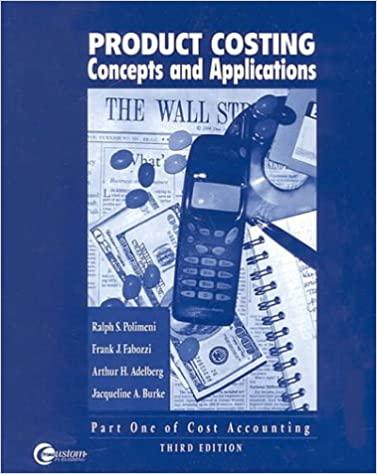Answered step by step
Verified Expert Solution
Question
1 Approved Answer
Please help with Question 1 (Adam Tran Winery) and Question 2 (Dowie) Adam Tran Winery is located in the Niagara area of southern Ontario. Adam



Please help with Question 1 (Adam Tran Winery) and Question 2 (Dowie)
Adam Tran Winery is located in the Niagara area of southern Ontario. Adam Tran started the winery in the early 1970s as a means of using the excess grapes from his vineyard. By experimenting with grapes and processing tech- niques, Adam Tran Winery has been able to produce an increasing number of quality wines. Starting in the early 2000s, the children and grandchildren of Adam Tran were operating and expanding the winery. It was contracting with local vineyards for all grapes used in production There are 30 varieties of wine that are placed into four Adam Tran groups for production, marketing, and management purposes. The groups are Premium brands, Quality+, Quality, and Popular. The profitability of Adam Tran Winery is shown in Exhibit 1. Each group is managed by a senior vice president, and all told the presi dent that the allocation of excess capacity is unfair. There are complaints that 100% of plant capacity overhead is being allocated to group production costs rather than the capacity being used. This allocation largely refers to the amorti zation of production assets, as noted in Exhibit 1. The winery mainly focused on the long term production and marketing of quality wines. Three years ago, the plant capacity was increased to meet a 20- 5951 Exhibiti Operating Income (millions of dollars) Sales Cost of goods sold Amortization of production assets Gross profit Selling and administrative expenses Amortization of selling and administrative assess Interest expenses Operating income $599 57 $238 10 5295 1 CASE 1: ADAM TRAN WINERY Total 951 Exhibit 2 Profitability by Product Group (millions of dollars) Premium Quality+ Quality Popular Sales 150 286 200 25 Direct materials 18 Direct labour 40 75 40 Variable overhead 36 SS 43 Fixed overhead Gross profit 90 60 Variable S&A 36 37 Fixed S&A 20 sa Interest expenses 2 2 3 Operating income 8 15 8 10 37 year growth plan. That meant once the additional capacity came fully on stream (two years ago), the winery had excess capacity. It is presently operating at 70% of capacity. Its plant operates 24 hours a day for each day of the year. Real growth in sales (after subtracting inflation) has been 4% a year, and that is expected to continue into the future. The board of directors is unhappy with the profitability of the Popular wines group. Exhibit 2 shows the profitability of each group, and the relatively poor performance of the Popular group. Nevertheless, the Popular group is expected to grow faster than the other three groups, and sales and administra Live capacity was put in place to prepare for that sales growth. A number of the board members want to sell the Popular group. Required Assume that the Popular brand is being charged with 40% more overhead than needed for its level of sales and production and that the excess overhead will be charged to a corporate account. Given this change in overhead allocation, what will be the profitability of the Popular brand? Dowie Corporation manufactures protein additives for domestic and interna- tional companies. As the new cost accountant for Dowie, you have been assigned the task of analyzing a production problem. Dowie produces three major protein additive products which differ in demand (in units each weighing 100 kilograms), price (per hundred kilograms), variable costs, fixed costs (allocated by ABC), and time (minutes) in produc- tion. Demand (in unit) Price Variable costs Allocated fixed costs Operating income Time in production (min.) Product A 100,000 $150 $80 $60 $10 4 Product B 300,000 $85 40 S25 Product C 500,000 $55 $15 $25 $15 2 $20 3 Presently demand exceeds capacity. Consequently, Dowie has capacity con- straints. Management is concerned with exploiting slack and expediting jobs or orders. Dowie uses an operations costing system. Dowie has three production lines, and each line can produce each of the above products. Set up time to switch from producing one product to another is close to zero. Each of the three production lines operates 24 hours a day for 360 days a year (25,920 hours), which leaves five days a year for maintenance. All three products go through the same work centres in roughly the same sequence, but require the same or different processing. Some work centres, called bottlenecks, have less capacity than others. The president and the production vice president are unsure how to make the most money under the current business environment. Required With the case approach, recommend to the president and the vice president how to maximize profitsStep by Step Solution
There are 3 Steps involved in it
Step: 1

Get Instant Access to Expert-Tailored Solutions
See step-by-step solutions with expert insights and AI powered tools for academic success
Step: 2

Step: 3

Ace Your Homework with AI
Get the answers you need in no time with our AI-driven, step-by-step assistance
Get Started


